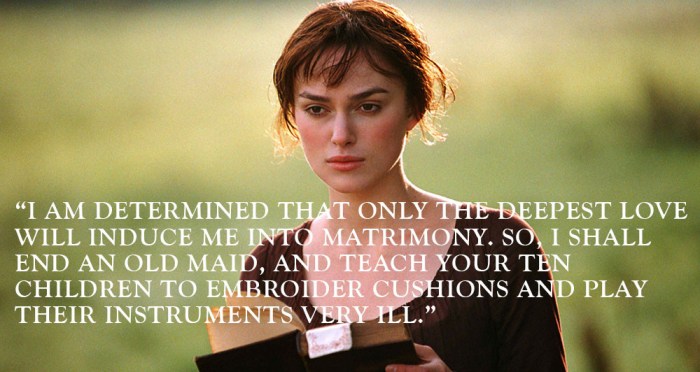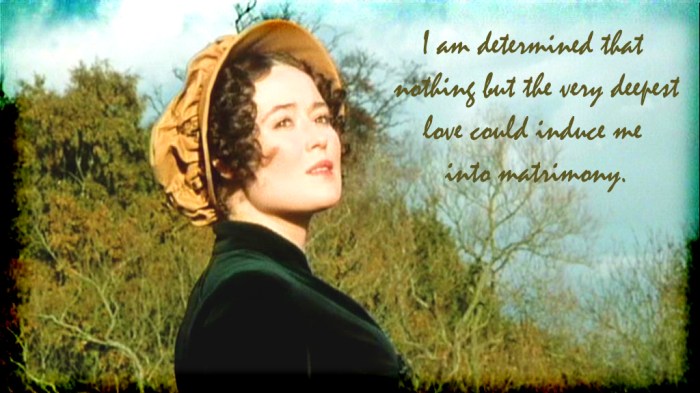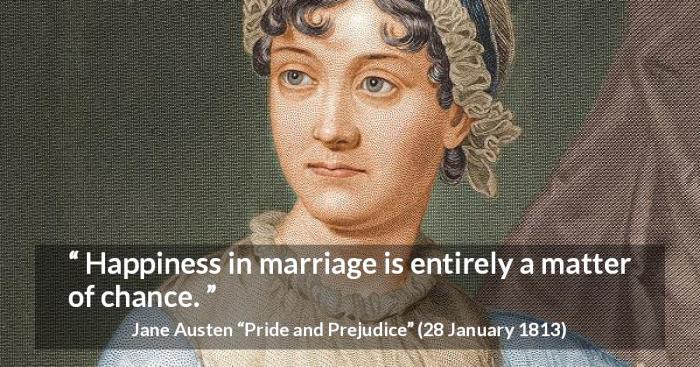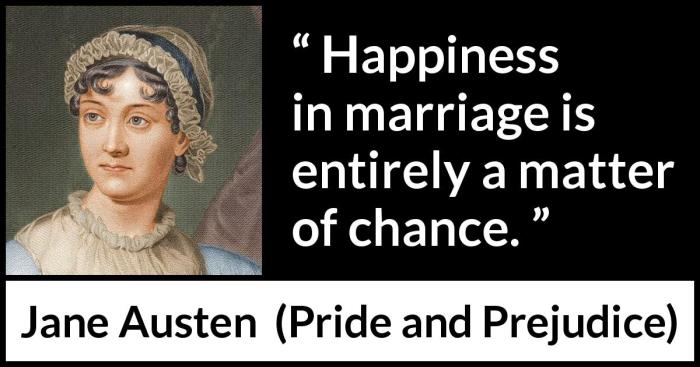Marriage quotes pride and prejudice – Marriage Quotes in Pride and Prejudice offers a captivating exploration of the complex and multifaceted nature of marriage in the Regency era. Through its rich characters and witty dialogue, the novel delves into the societal expectations, gender roles, and personal desires that shape the marital experiences of its protagonists.
The story presents a nuanced portrayal of marriage as both a source of pride and prejudice, highlighting the ways in which societal norms and personal biases can influence the pursuit of love and happiness.
Marriage as a Social Institution

Marriage in the Regency era depicted in Pride and Prejudice was a highly regulated and structured social institution. Societal expectations dictated that marriage should be based on financial stability, social status, and the preservation of family lineage.
These expectations influenced the characters’ decisions and actions. For example, Mr. Collins’s primary motivation for proposing to Elizabeth Bennet is to secure his social standing as a clergyman and gain access to her family’s wealth. Similarly, Lady Catherine de Bourgh’s attempts to arrange a marriage between Mr.
Darcy and her daughter, Anne, are driven by her desire to maintain the family’s prestige.
Marriage also played a significant role in securing financial stability. In a society where women had limited opportunities for financial independence, marriage provided them with a means of economic security. This is evident in the case of Charlotte Lucas, who marries Mr.
Collins despite her lack of romantic feelings for him, primarily to secure her future.
Love and Compatibility in Marriage: Marriage Quotes Pride And Prejudice

Pride and Prejudice explores different perspectives on love and compatibility in marriage. Mr. Darcy and Elizabeth Bennet initially clash due to their differing views on love. Darcy believes in marrying for love and compatibility, while Elizabeth is more practical and values financial stability and social status.
The novel also highlights the challenges of finding a compatible partner in marriage. Mr. Collins’s awkward and inappropriate proposal to Elizabeth is a humorous example of the difficulties of finding a suitable match. In contrast, Mr. Knightley’s relationship with Emma Woodhouse in Jane Austen’s later novel, Emma, is a model of compatibility and mutual affection.
Gender Roles and Marriage

Gender roles and expectations shape the relationships between men and women in Pride and Prejudice. Women are expected to be subservient to men and to focus on domestic duties, while men are expected to be dominant and responsible for financial matters.
These roles influence the characters’ interactions and decision-making. For example, Elizabeth Bennet’s refusal to accept Mr. Collins’s proposal is seen as a challenge to traditional gender norms. Similarly, Mr. Darcy’s initial reluctance to propose to Elizabeth is influenced by his pride and his belief that she is beneath him in social status.
Marriage reinforces traditional gender roles in Pride and Prejudice. However, it also provides opportunities for women to gain some degree of independence and autonomy. Elizabeth Bennet’s marriage to Mr. Darcy allows her to escape the constraints of her family home and pursue her own interests.
Marriage as a Source of Pride and Prejudice

Marriage can be a source of both pride and prejudice in Pride and Prejudice. Mr. Darcy’s pride in his social status and wealth initially blinds him to Elizabeth’s true worth. Similarly, Elizabeth’s prejudice against Mr. Darcy based on his initial arrogance prevents her from recognizing his true character.
The novel explores the consequences of allowing pride or prejudice to influence one’s approach to marriage. Mr. Darcy’s pride leads him to make a condescending proposal to Elizabeth, which she rightly rejects. Elizabeth’s prejudice against Mr. Darcy blinds her to his true character, leading to a period of misunderstanding and estrangement.
Ultimately, Pride and Prejudice suggests that marriage should be based on love, compatibility, and mutual respect, rather than pride or prejudice.
Answers to Common Questions
What is the significance of marriage in Pride and Prejudice?
Marriage is a central institution in Pride and Prejudice, serving as a means of securing social status, financial stability, and personal fulfillment.
How do societal expectations influence the characters’ decisions about marriage?
Societal expectations play a significant role in shaping the characters’ decisions about marriage. For example, Elizabeth Bennet’s refusal to marry Mr. Collins stems from her desire to find a compatible partner based on love and mutual respect.
What are the different perspectives on love and compatibility expressed by the characters?
The characters in Pride and Prejudice hold diverse perspectives on love and compatibility. Mr. Darcy believes in marrying for love and mutual respect, while Mr. Wickham views marriage as a means of financial advancement.